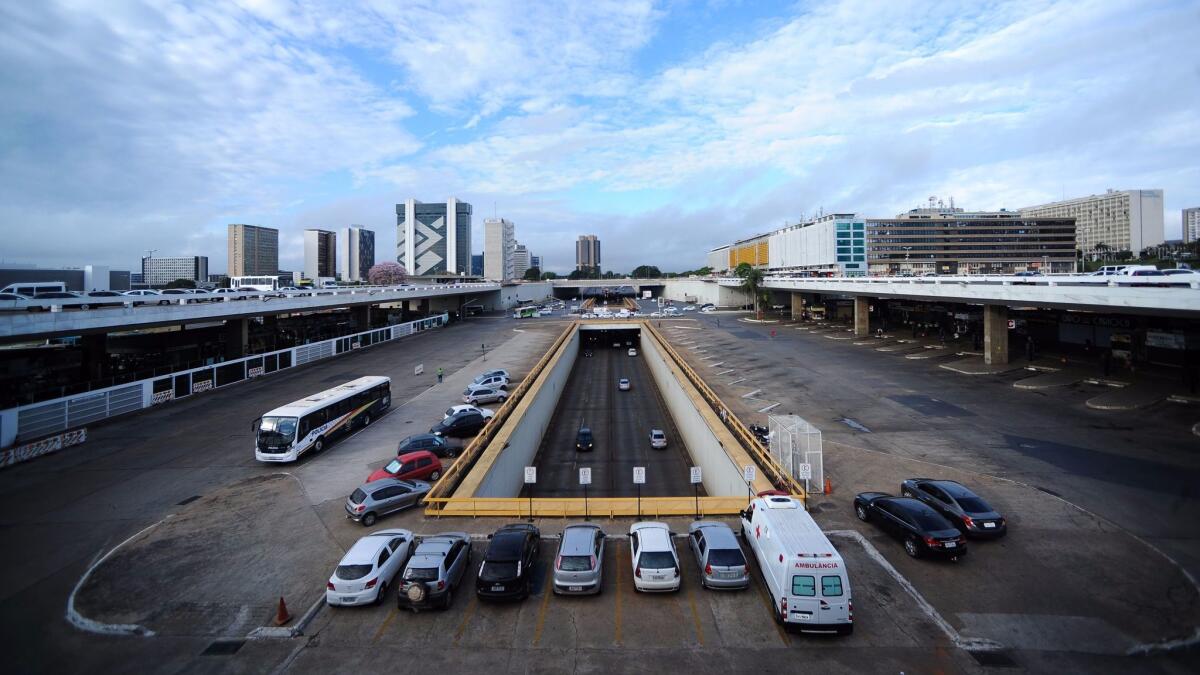In Brazil, protesters clash with police as a general strike empties schools and brings business to a halt
- Share via
Reporting from SAO PAULO, Brazil — Protests large and small swept across Brazil on Friday, leaving businesses closed, schools empty and an unpopular president facing ever louder calls to step down.
For the first time in more than 20 years, Brazilians held a general strike, with millions of workers walking off the job to protest controversial labor and pension reforms that were proposed by a president with an approval rating of just 4% and that are currently moving through Congress. Thousands of protesters took to the streets in the country’s major cities, many carrying signs reading “Fora Temer!” — “out” with President Michel Temer.
Most protests passed without incident, but by Friday night a group of protesters advanced on the Sao Paulo neighborhood where Temer owns a house. They broke up sidewalks and lobbed chunks of concrete at police trying to disperse the crowd with tear gas and flash grenades. Protesters also set some buses on fire, and at least 16 arrests were reported.
A larger, peaceful protest, estimated at 70,000, headed out in the direction of Temer’s home from a nearby neighborhood earlier in the evening to protest the president, whom they consider illegitimate, and his recent proposed labor and pension reforms. Temer, the former vice president who succeeded Dilma Rousseff as president after she was impeached last year, still lives in the vice president’s residence in Brasilia, the capital.
The activity directed at Temer’s house was just a small part of a day of protest that touched the lives of Brazilians across the country. Among those affected was Jose Carlos Rodrigues Jr., who had heard of the plans for a general strike and had wondered how events would play out.
At 8 a.m. he took his 1-year-old daughter, Isadora, to catch a bus that usually takes them from their home in the coastal city of Santos to the megacity of Sao Paulo. It never arrived.
Rodrigues wasn’t surprised, nor that disappointed, despite the inconvenience.
“I tried my luck, and I was happy to see that I had to wait,” Rodrigues said. “It meant the strike had gone forward. I very much support it.”

Across the country, Brazilians in major cities across the country all woke up to empty streets. Many businesses failed to open and both public and private schools closed their doors as Brazil was partially paralyzed Friday morning.
Rodrigues and Isadora were able to make it to their destination thanks to a ride from an uncle and another wait for a chartered bus, but many who wanted to go to work were late or never arrived.
“There aren’t any buses running and it’s way too far to go by bike,” said Wilson Almeida, who tried to get to the bakery where he works as a server. “I can’t afford to go by Uber. The money I would earn today would basically pay to get me to and from work. And my boss won’t understand.”
Like Almeida, many worried about losing their jobs if they missed work — whether because they participated in the strike or just couldn’t get where they needed to go — particularly because of Brazil’s economic crisis and steep unemployment.
A popular suggestion circulating on social media was to use the day off to donate blood. Not only would it help those in need, it would provide a perfect excuse; in Brazil, you can miss a day of work without penalty if you get a doctor’s note saying you were donating blood.
In cities such as Sao Paulo, Rio de Janeiro and Brasilia, groups of protesters blocked roads with burning tires, or threw rocks at police, who were firing tear gas in order to disperse crowds. Peaceful protesters invaded airports in Sao Paulo and blocked entrances to those in other cities, but the majority of flights took off and landed without a problem.
Sao Paulo’s Largo da Batata neighborhood was later the site of a huge march. Videos circulating Friday night on Twitter showed vast crowds.
Sao Paulo Mayor Joao Doria, known for promoting himself as a hard worker, had repeatedly opposed the strike in recent days and echoed that opposition Friday.
“I wake up early and work. I’m not a striker who sleeps, is lazy and wakes up late,” he said in a radio interview. “With this type of confrontation, only the working, honest population loses.”
A congressional bill that would weaken labor laws passed this week in the lower house of Congress. Among the items on the bill, which will now be voted on in the Senate, are an end to paid overtime, the possibility of working under a temporary contract permanently, and the ability to lay off an entire staff and replace them with lower-salaried workers without any penalty to the company.
A controversial pension reform, which would set minimum retirement ages for men and women at 65 and 62, respectively, is also expected to be voted on next week.
Despite the government saying that the current pension system in Brazil is unsustainable and that it is dragging the economy down, Temer and members of Congress who have worked on the bill gave in to pressure from the public on certain items, including the minimum retirement age, which was initially 65 for both men and women.
“Today’s protest is to show that we reject the attitudes of the government, which, in my opinion, came to office in an illegitimate way and has since pushed sudden reforms and proposals that restrict the rights of Brazilian citizens,” said law student Lais Dumitrescu Dias as she headed to a protest in Sao Paulo. “Everyone has the right to retire with the guarantee [they will live] life with dignity after serving their country for so many years.”
Langlois is a special correspondent.
ALSO
Pope Francis delivers anti-terrorism message to open two-day visit to Egypt
We went to North Korea. You asked hundreds of questions. Here’s what we found
Mexico is in love with a $5,000 hairless dog that often wins competitions — in the ugliest category
More to Read
Sign up for Essential California
The most important California stories and recommendations in your inbox every morning.
You may occasionally receive promotional content from the Los Angeles Times.













